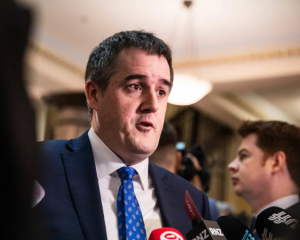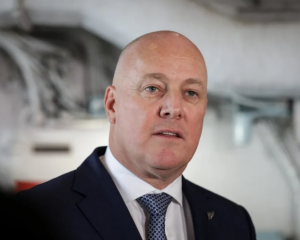The race was thrown wide open yesterday when Mr Parker, the party's acting leader after its drubbing last month, changed his mind and entered.
He initially said he did not intend to stand.
Mr Parker joins fellow MPs David Cunliffe, Andrew Little and Grant Robertson in vying for the role. He is likely to be frontrunner because of his standing in caucus.
He launched his bid before media in Auckland.
Yesterday, he told the Otago Daily Times his chief difference from Prime Minister John Key was hailing from Dunedin, a place he says has values he champions.
''I am an egalitarian politician, and I derive those values from Dunedin,'' he said.
''I'm so proud of the education services, the way we are tolerant people, the way we're not flashy about money, the way we are kind to each other, and the way we look after our beautiful city and environment.''
Mr Parker, the party's finance spokesman, is also accepting responsibility for policies such as the superannuation age rise, which he personally championed.
He has suggested the super age rise debate could be a suitable topic for a referendum, rather than Labour carrying it as an unpopular, albeit principled, policy.
All the party's 2014 policies would be reviewed, including the capital gains tax.
Under his watch, the party would push ''egalitarian'' economic policies more than so-called identity issues around race and sexuality.
Mr Parker said he supported progressive changes such as marriage equality, which Labour successfully sponsored into law in the last Parliament, but a change of emphasis was needed for the ''next wee while''.
''We have become less identified with the interests of working New Zealanders than used to be the case. And that's a place for us to get back to.''
Mr Parker would not comment about his preferred deputy, or whether Mr Cunliffe could have a place on his front bench. He would not comment on likely successors to the finance minister role, but said there were ''plenty of contenders''.
As leader, he would retain some oversight of finance. He was pleased the party had won back its reputation for being fiscally responsible.
''I'm a Southerner. We are careful with money down South. And I always will be.''
Mr Parker described himself as a centrist politician, and believed there was no significant philosophical difference between himself and Messrs Little, Robertson and Cunliffe.
However, there were likely to be differences in what each man would drop for the sake of pragmatism, he said.
He would not speculate on whom he considered his main opposition, saying it was as yet unclear, but he expected to get fewer votes from the unions than Mr Little.
He wants to have an ''honest conversation'' with Labour about reconnecting with voters, and an ''outward conversation'' with New Zealanders.''
Labour has to present itself as the party more attached to the aspirations of working New Zealanders who want to be prosperous.
''They want to get ahead if they work hard, and get the things that should come from that, including owning your own home.''
People from across the political spectrum were telling him Labour needed to be strong, in order to serve as a functioning, effective Opposition. Many had asked him to stand for leader in the past 10 days.
The tone of New Zealand politics must change, to be less focused on conflict, Mr Parker said.
''What I would describe as 'gotcha' politics, which I don't think serves New Zealand especially well,'' Mr Parker said.
''There's always a need to be strong. But that doesn't mean that you have to disagree with everything that the Government's promoting.
''Politics ought not to be war without guns, or some new version of a Game of Thrones.
''The tone of politics has become very strident and uncivilised.''
Mr Parker said some internet blogs, particularly Whale Oil, were ''disgraceful and disgusting''. However, he did not see it as confined to the right-wing online media, saying some left-leaning bloggers went too far as well. He would challenge them to lift their standards.
There was a public appetite for higher standards in politics, which had been exposed as lacking in Nicky Hager's book Dirty Politics.
Asked about low voter turnout and enrolment, he said New Zealanders should be able to vote by showing their Inland Revenue Department number. The initiative could also save money.
On regional development, he said cities like Dunedin and other regional centres needed to be stronger because New Zealand did not benefit from having only a couple of big centres.
Mr Parker was raised in Dunedin, forging a career in law and business in the city before entering Parliament 12 years ago.
He has maintained links with the city, splitting weekends between Dunedin and Auckland.
He denied he had changed his mind about standing when Mr Little had criticised some of his economic policies; ''I'm not that prickly'', he said.
David Parker
• Born in Roxburgh, in 1960; grew up and studied in Dunedin.
• Studied commerce and law at the University of Otago.
• Co-founded Dunedin Community Law Centre.
• Former litigation and managing partner at Anderson Lloyd.
• Helped start biotech businesses, including Blis Technologies.












